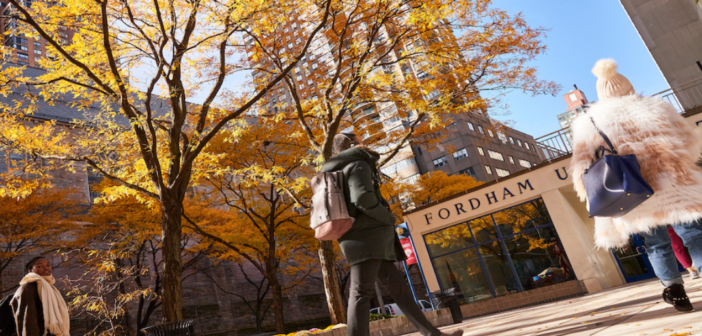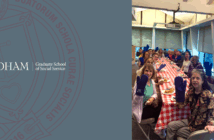The new academic year always brings electricity.
That feeling pulsed through all three Graduate School of Social Service orientations this past week, where GSS faculty and administration welcomed budding social workers to the 2022-2023 academic year online, at the Lincoln Center campus, and at the Westchester campus.
More than 450 students enrolled in the Master of Social Work (MSW) program at GSS this fall, ready to learn the skills and tools they will use to become changemakers in their communities and society.
“You’ve entered the profession at a time where you are so needed,” said Debra McPhee, Ph.D., dean of GSS. “Thank you for choosing Fordham, and thank you for choosing social work.”
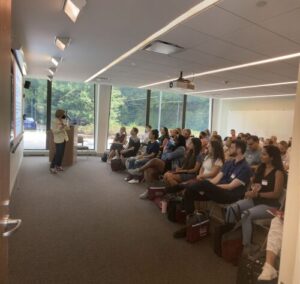
White-Ryan addressing students at the Westchester campus.
Associate Dean for Academic Affairs Linda White-Ryan, Ph.D., reminded incoming students that while social workers are vital catalysts in bettering the lives of individuals and communities, the profession is not composed of “fixers.” One of the core tenets of social work ethics is that the individual client has the right to self-determination — meaning, they choose whether or not they receive the help they need. But social workers need to be ready when that time comes.
“We don’t fix people,” White-Ryan said. “We empower them to help themselves.”
Meeting Fordham: A Campus, A Home, A Family
After opening remarks, students were introduced to the many faces they will learn from and bond with over their MSW experience. Full-time faculty members gave teasers about their area of expertises, highlighting several GSS programs and initiatives, such as:
- The Action Committee for Racial and Social Justice
- The MSW/MPH Dual-Degree Program
- The Palliative Care Fellowship
- The PIPELINE for Youth Health Program
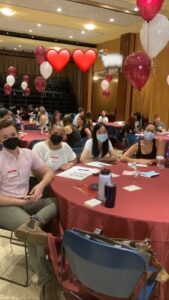
Students at the Lincoln Center campus.
In addition, members of the field department stressed the importance of field education — social work’s signature pedagogy — in the MSW experience. Students also had the opportunity to hear from campus liaisons representing Fordham Counseling and Psychological Services, Fordham IT, and Fordham Libraries.
Professor Marciana Popescu, Ph.D., gave a heartfelt speech on forced migration as a global issue, and one especially pertinent to New York City — as migrants are currently being forced by bus out of Texas and into NYC.
Popescu introduced students to Her Migrant Hub, a grant-funded project spearheaded by herself and Professor Dana Alonzo, Ph.D., designed to help asylum seekers in NYC. Funded by the Mother Cabrini Health Foundation, Her Migrant Hub is currently seeking MSW students to participate in this project at a time when migrant services are crucially needed.
A Code of Ethics Setting Social Work Apart
White-Ryan also took time to detail the dichotomous balance of art and science that presents naturally to social work.
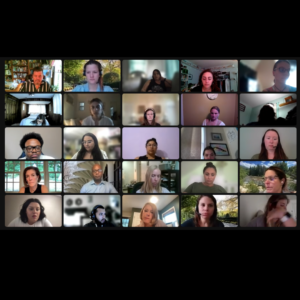
Students in our Online MSW program joined in from all over the country for their first day of school.
“Social work is an art; it requires the development of important skills to understand people and to help them to help themselves,” White-Ryan said. “It is also a science, because of its problem solving method and its attempt to be objective in ascertaining facts and in developing principles and operational concepts.”
White-Ryan explained that, guided by the National Association of Social Workers’ code of ethics — the largest code of ethics, she added, among the “helping” professions — social work stands out because of three unique pillars which make up its foundation:
- Its Person-in-Environment Perspective: Social workers see people as being connected to a larger social world. This might include family, school, community, or peer groups.
- Its Strengths Perspective: Social workers assume that everyone has strengths, and that there are strengths in the resources around us. They help people to find and utilize these areas of strength.
- The Client’s Right to Self-Determination: It is up to the individual client to decide whether or not to receive services from a social worker. No fixing, all empowering.
The decision to attend graduate school and attain one’s MSW is one of the most impacting decisions an individual can make. For many, that feeling is both liberating and a bit scary. We received some insight into why these newest Rams chose Fordham for their educational path, and why they want to be a part of this vital profession:
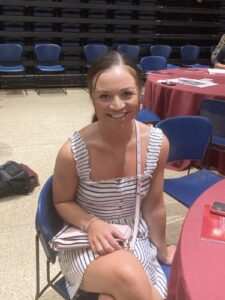 Kayla Whelan
Kayla Whelan
Why do you want to be a social worker?
“I majored in psychology and I love the mental health field. I know from that experience that I definitely want to work in this field.”
Why did you choose Fordham for your MSW experience?
“My younger sister is actually an undergrad at Fordham. She loves it. So, I get to see her.”
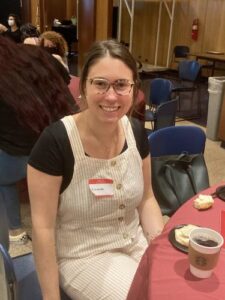 Amanada Svachula
Amanada Svachula
Why do you want to be a social worker?
“I went to journalism school and really liked it and I’ve worked as a journalist for the past 4 years or so, but I realized that instead of interviewing people I wanted to talk to them and advocate for them and do more than just write about them.”
Why did you choose Fordham for your MSW experience?
“The part-time program was what drew me in, because I’m still working full-time. The flexibility!”
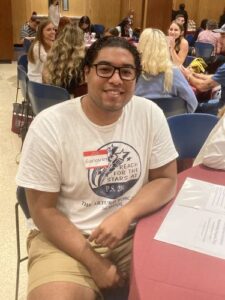 Giancarlos Valerio
Giancarlos Valerio
Why do you want to be a social worker?
“I’ve always had a knack for helping people. I grew up in a blue-collar home. My dad worked in the city and my mom worked at a school. She worked helping kids out and seeing that made me want to help others, too.”
Why did you choose Fordham for your MSW experience?
“I heard Fordham was a good program, and everyone told me what a nice school it is. I figured I’d try my luck, and here I am.”
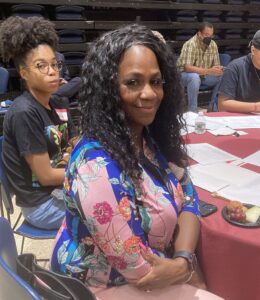 Felicia Smith-Medina
Felicia Smith-Medina
Why do you want to be a social worker?
“I work in child welfare right now and there is so much trauma that I see adolescents experience. I want to use the skill sets I learn from social work and Fordham to make a difference.”
Why did you choose Fordham for your MSW experience?
“I have a few alumni at my job that graduated and they encouraged me to apply – they said there is a lot of support at Fordham and I would learn a lot.”
GSS wishes all of our students well for this upcoming academic year and throughout the rest of their careers.
